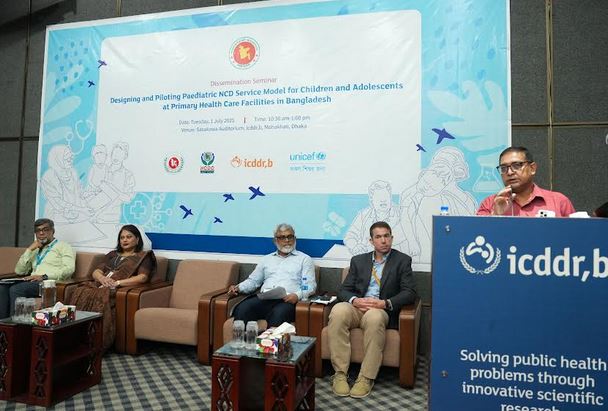News Flash
News Flash

DHAKA, July 1, 2025 (BSS) - In a major step toward addressing the growing burden of non-communicable diseases (NCDs) among children, Bangladesh's first evidence-based service delivery model for paediatric NCD care has been successfully piloted at the primary healthcare level.
Led by icddr,b, in collaboration with the Non-Communicable Disease Control (NCDC) unit of the Directorate General of Health Services (DGHS) and supported by UNICEF Bangladesh, the initiative is a significant move toward integrating paediatric NCD services into the national health system, said a press release here today.
Findings from the project titled "Designing and Piloting Pediatric NCD Service Model for Children and Adolescents at Primary Health Care Facilities in Bangladesh", were presented today at a dissemination seminar held at icddr,b's Sasakawa Auditorium in the city's Mohakhali area.
The study aimed to identify priority paediatric NCDs specific to the Bangladesh context and develop a comprehensive service delivery model for managing these conditions at the primary healthcare level.
According to the Global Burden Report 2019, over 2.1 billion children were affected by non-communicable diseases (NCDs) in 2017, with around one million paediatric deaths.
However, Bangladesh lacks reliable data on paediatric NCDs, reflecting gaps in research, treatment, and policy. Notably, the World Health Organization's Pen-Plus priority pediatric NCDs, such as rheumatic heart disease and sickle cell disease are mainly prevalent in Sub-Saharan Africa and less common in South Asian Countries such as Bangladesh.
To address the country specific needs and ensure the actual burden is not overlooked, six priority paediatric NCDs for Bangladesh: Bronchial Asthma, Congenital Heart Disease, Epilepsy, Thalassemia, Kidney Disease, and Type 1 Diabetes, were identified through a comprehensive, evidence-based approach under the study.
Based on these findings, in 2024 Bangladesh developed its first National Treatment Protocol for paediatric NCDs, providing standardised medical care guidelines for children.
The first comprehensive service delivery model, launched on 10 February 2025 across 12 Upazila Health Complexes in Kishoreganj, eight in Bagerhat and two district hospitals successfully integrated dedicated paediatric NCD services for children aged 0 to 17 years into primary healthcare facilities.
In the first seven weeks of implementation, a total of 385 children were diagnosed and enrolled. Bronchial Asthma was the most prevalent diagnosis, accounting for 36.6 percent (pc) of cases, followed by Thalassemia and Iron Deficiency Anaemia (27.5pc), Congenital Heart Disease (19.1pc), Epilepsy (13.6pc), Nephrotic Syndrome (2.2pc), and Type 1 Diabetes (1pc). About eight
percent of the patients were referred to specialized centres for advanced treatment.
To ensure quality service delivery, over 200 healthcare professionals, including doctors, nurses, and SACMOs; and more than 500 CHCPs were trained under the initiative. The initiative was further supported by the Community Based Health Care (CBHC) and Management Information System (MIS) programmes of DGHS.
The event was graced by several distinguished special guests including Professor Dr. Shah Ali Akbar Ashrafi, Former Director of MIS and Line Director of Health Information System and e-Health, DGHS; Professor Dr Syed Zakir Hossain, Line Director of NCDC, DGHS.
Professor Dr Syed Zakir Hossain emphasized the importance of preventing non-communicable diseases and called for scaling up the program by addressing the challenges identified through this study.
Health Manager for Maternal, Newborn, Child, and Adolescent Health at UNICEF Bangladesh Dewan Md. Emdadul Haque, Senior Scientist of icddr,b Dr Aliya Naheed and Senior Director of the Nutrition Research Division at icddr,b Dr Thaddaeus David May, among others, were present at the event.